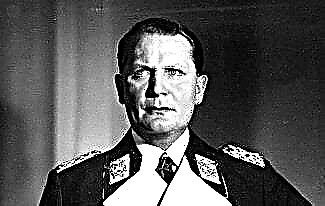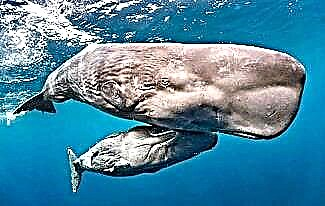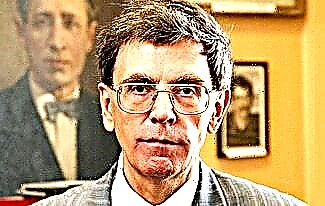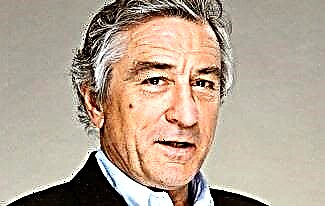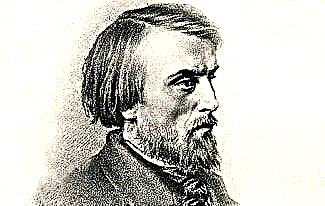Ilya Ilyich Mechnikov (1845-1916) - Russian and French biologist (microbiologist, cytologist, embryologist, immunologist, physiologist and pathologist). Laureate of the Nobel Prize in Physiology or Medicine (1908).
One of the founders of evolutionary embryology, the discoverer of phagocytosis and intracellular digestion, the creator of the comparative pathology of inflammation, the phagocytic theory of immunity, the theory of phagocytella, and the founder of scientific gerontology.

There are many interesting facts in the biography of Ilya Ilyich Mechnikov, which we will talk about in this article.
So, before you is a short biography of Ilya Mechnikov.
Biography of Mechnikov
Ilya Mechnikov was born on May 3 (15), 1845 in the village of Ivanovka (Kharkov province). He grew up in the family of a serviceman and landowner, Ilya Ivanovich, and his wife Emilia Lvovna.
In addition to Ilya, his parents had four more children.
Childhood and youth
Ilya was brought up in a wealthy family. His mother was the daughter of a very rich Jewish financier and writer, who is considered to be the founder of the genre of "Russian-Jewish literature", Lev Nikolaevich Nevakhovich.
Mechnikov's father was a gambling man. He lost all his wife's dowry, which is why the ruined family moved to the family estate in Ivanovka.
As a child, Ilya and his brothers and sisters were taught by home teachers. When the boy was 11 years old, he entered the 2nd grade of the Kharkov male gymnasium.
Mechnikov received high marks in all disciplines, as a result of which he graduated from high school with honors.
At that time biographies, Ilya was especially interested in biology. After graduating from high school, he continued his studies at Kharkov University, where he listened with great pleasure to lectures on comparative anatomy and physiology.
An interesting fact is that the student was able to master the curriculum not in 4 years, but in just 2.
The science
After graduating from the university, Mechnikov spent some time in Germany, where he specialized with the German zoologists Rudolf Leuckart and Karl Siebold.
At the age of 20, Ilya left for Italy. There he became closely acquainted with the biologist Alexander Kovalevsky.
Thanks to the joint efforts, the young scientists received the Karl Baer Prize for discoveries in embryology.
Returning home, Ilya Ilyich defended his master's thesis, and later his doctoral dissertation. By that time he was barely 25 years old.
In 1868 Mechnikov became an assistant professor at Novorossiysk University. At that time in his biography, he already enjoyed great prestige with his colleagues.

The discoveries made by the scientist were far from immediately accepted by the scientific community, since Mechnikov's ideas turned upside down the generally accepted norms in the field of the human body.
It is curious that even the theory of phagocytic immunity, for which Ilya Ilyich was awarded the Nobel Prize in 1908, was often harshly criticized.
Before the discoveries of Mechnikov, leukocytes were considered passive in the fight against inflammatory processes and ailments. He also stated that white blood cells, on the contrary, play an important role in protecting the body, destroying dangerous particles.
The Russian scientist proved that the increased temperature is nothing more than a consequence of the struggle of immunity, therefore, it is simply not permissible to bring it down to a certain level.
In 1879 Ilya Ilyich Mechnikov discovered an important function of intracellular digestion - phagocytic (cellular) immunity. Based on this discovery, he developed a biological method for protecting plants from various parasites.
In 1886, the biologist returned to his homeland, settling in Odessa. He soon began collaborating with the French epidemiologist Nicholas Gamaleya, who had once trained under Louis Pasteur.
A few months later, scientists opened the world's 2nd bacteriological station to fight infectious diseases.
The following year, Ilya Mechnikov leaves for Paris, where he gets a job at the Pasteur Institute. Some biographers believe that he left Russia due to the hostile attitude of the authorities and his colleagues.
In France, a man could continue to work on new discoveries without hindrance, having all the necessary conditions for this.

During those years, Mechnikov wrote fundamental works on the plague, tuberculosis, typhoid and cholera. Later, for his outstanding services, he was entrusted to head the institute.
It is worth noting that Ilya Ilyich corresponded with Russian colleagues, including Ivan Sechenov, Dmitry Mendeleev and Ivan Pavlov.
It is interesting that Mechnikov was interested not only in the exact sciences, but also in philosophy and religion. Already in old age, he became the founder of scientific gerontology and introduced the theory of orthobiosis.

Ilya Mechnikov argued that a person's life should reach 100 years or more. In his opinion, a person can prolong his life through proper nutrition, hygiene and a positive outlook on life.
In addition, Mechnikov singled out the intestinal microflora among the factors affecting life expectancy. Several years before his death, he published an article on the benefits of fermented milk products.
The scientist outlined his ideas in detail in the works "Studies of Optimism" and "Studies of Human Nature".
Personal life
Ilya Mechnikov was a rather emotional and inclined person to mood swings.
In his youth, Ilya often fell into depression and only in his mature years was he able to achieve harmony with nature, and to look positively at the world around him.
Mechnikov was married twice. His first wife was Lyudmila Fedorovich, with whom he married in 1869.
An interesting fact is that his chosen one, who suffered from tuberculosis, was so weak that during the wedding she had to sit in an armchair.
The scientist hoped that he could cure his wife from a terrible illness, but all his attempts were unsuccessful. 4 years after the wedding, Lyudmila died.
The death of his beloved was such a strong blow for Ilya Ilyich that he decided to end his life. He took a huge dose of morphine, which resulted in vomiting. Only thanks to this the man remained alive.

The second time, Mechnikov married Olga Belokopytova, who was 13 years younger than him.
And again the biologist wanted to commit suicide, due to the illness of his wife, who caught typhus. Ilya Ilyich injected himself with the bacteria of relapsing fever.
However, having been seriously ill, he managed to recover, as, indeed, his wife.
Death
Ilya Ilyich Mechnikov died in Paris on July 15, 1916 at the age of 71. Shortly before his death, he suffered several heart attacks.
The scientist bequeathed his body to medical research, followed by cremation and burial on the territory of the Pasteur Institute, which was done.
Mechnikov Photos








